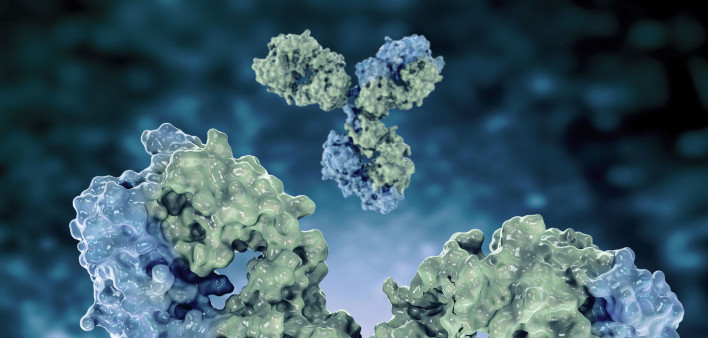On March 22, the Food and Drug Administration (FDA) granted emergency use authorization for Pemgarda (pemivibart), a new monoclonal antibody that lowers the risk of COVID-19 in immunocompromised people.
Recombinent monoclonal antibodies are manufactured proteins that resemble the natural antibodies the immune system produces to fight infection. Pemgarda, from the biotech company Invivyd, was designed to target the SARS-CoV-2 spike protein, which the coronavirus uses to enter human cells, and it is tailored to current omicron variants.
While most people respond well to COVID vaccines that train the immune system to produce its own antibodies against the virus, people with compromised immune function may not fare as well. These include people with genetic immunodeficiency, organ transplant recipients, people with advanced or untreated HIV, people with certain blood cancers, people receiving some types of cancer treatment (including CAR-T therapy or stem cell transplants) and those taking other medications that suppress immune response.
“People who are immunocompromised continue to be disproportionally impacted by COVID-19 even after receiving multiple vaccine doses,” Cameron Wolfe, MBBS, MPH, a transplant expert at Duke University School of Medicine, said in an Invivyd news release. “I’m excited to have Pemgargda as an additional COVID-19 preventive option for moderately to severely immunocompromised adult and adolescent patients, such as solid organ transplant recipients and those with hematological malignancies. These types of patients, among others, continue to have both an impaired response to vaccines and a higher risk for severe COVID-19 outcomes.”
In late 2021, the FDA approved a monoclonal antibody combination called Evusheld (tixagevimab plus cilgavimab) for people with compromised immunity. But this authorization was revoked a year later after new coronavirus variants developed resistance that rendered Evusheld ineffective. Since then, there has been no approved COVID pre-exposure prophylaxis (PrEP) option for immunocompromised individuals.
Pemgarda (formerly known as VYD222) is indicated for adults and adolescents ages 12 and older “who have moderate to severe immune compromise due to a medical condition or due to taking immunosuppressive medications or treatments and are unlikely to mount an adequate immune response to COVID-19 vaccination,” according to the FDA. It is authorized only for people who do not currently have acute SARS-CoV-2 infection and have not had a known recent exposure to someone with the virus; it is not indicated for post-exposure prophylaxis. It is not yet clear whether Pemgarda might lower the risk of developing persistent post-acute symptoms or help people living with long COVID.
The FDA authorization was based on so-called “immunobridging” data, meaning scientists estimated the effectiveness of Pemgarda based on the activity of other monoclonal antibodies against SARS-CoV-2. These studies showed that pemivibart serum neutralizing antibody levels were consistent with those associated with efficacy in prior clinical trials of earlier monoclonal antibodies.
Pembivart is administered as a single intravenous infusion that lasts about 60 minutes. It is generally safe and well tolerated, but it should be given in a setting where health care providers can respond quickly to rare severe adverse reactions. Repeat dosing is recommended every three months for people who need ongoing protection.
Many people with compromised immune function can still mount a partial response to COVID vaccines, so vaccination is recommended for those who are able to safely receive them. For people with early SARS-CoV-2 infection, takings Paxlovid within five days after symptoms onset can reduce the risk of hospitalization or death.
Click here for more news about COVID-19 vaccines and treatment.







Comments
Comments